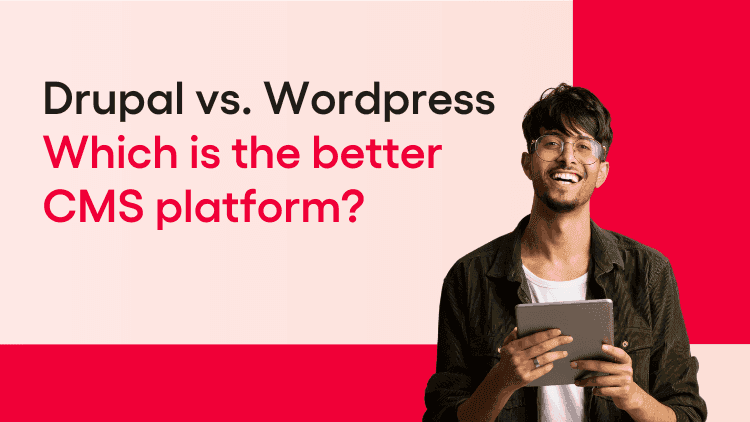When building a website, selecting the right content management system (CMS) is vital to how your brand is being presented to your audience. Over the years, Drupal and WordPress have become the frontrunners in the world of CMS. Both have their strengths and weaknesses, and the right choice depends on your particular needs and expertise. In this blog, we will compare Drupal vs WordPress to help you decide which platform is the right fit for you.
Overview of Drupal and WordPress
WordPress
WordPress is the most extensively used CMS, powering over 40% of existing websites on the Internet. It’s known for its user-friendly interface, extensive plugin ecosystem, and a large community of users and developers. WordPress is ideal for beginners and small to medium-sized websites, including blogs, e-commerce sites, and business websites.
Drupal
Drupal is a powerful and adaptable CMS designed for developers and more complex websites. It offers advanced features and customization choices, making it suitable for large enterprises, government websites, and other high-traffic sites. Drupal’s steep learning curve is offset by its robustness and scalability.
Difference Between WordPress and Drupal
Ease of Use
WordPress: Known for its intuitive interface, WordPress is easy to set up and manage. Its drag-and-drop editors and vast library of themes and plugins make it accessible for non-developers.
Drupal: Drupal requires a higher level of technical knowledge. Its interface is less user-friendly compared to WordPress, making it more suitable for developers or those willing to invest time in learning.
Customization and Flexibility
WordPress: While highly customizable through plugins and themes, WordPress can be limited by its ease of use. It’s perfect for those who need a quick setup without extensive coding.
Drupal: Drupal offers unparalleled flexibility and customization. It allows developers to create highly complex and tailored websites, thanks to its modular approach and extensive API support.
Security
Drupal vs WordPress Security: Both platforms have robust security features, but Drupal is often considered more secure due to its strict coding standards and enterprise-level security features. WordPress security largely depends on the plugins used and the diligence in maintaining updates. For high-security projects, Drupal might be the preferable choice.
Performance and Scalability
WordPress: Suitable for small to medium-sized websites, WordPress can handle high traffic with proper optimization. However, its performance can degrade if overloaded with too many plugins.
Drupal: Designed to handle large-scale websites, Drupal excels in performance and scalability. Its architecture offers an excellent avenue for efficient handling of high traffic and complex content structures.
Community and Support
WordPress: Boasts a large, active community with extensive documentation, forums, and tutorials. Many developers and agencies offer WordPress services, making it easy to find support.
Drupal: While smaller than WordPress, Drupal’s community is highly knowledgeable and dedicated. It has excellent documentation and forums, but finding professional support might be more challenging and expensive.
Cost
WordPress: Generally more cost-effective, especially for small projects. Many plugins and themes are free, and paid options are typically affordable.
Drupal: Development costs can be higher due to the need for professional expertise. While the CMS itself is free, the cost of custom development and maintenance can add up.
Read our latest blogs to learn more about “Different Types of CMS”
WordPress vs Drupal: Choosing the Right Platform
When to Choose WordPress
- If you’re a beginner or non-developer.
- If you need a website up and running quickly.
- If you require extensive plugin and theme options.
- For small to medium-sized websites.
When to Choose Drupal
- If you need a highly customized and complex website.
- If security is a top priority.
- For large-scale and high-traffic websites.
- If you have access to development expertise or are willing to invest in professional services.
Enhancing Your Skills
Whether you choose WordPress or Drupal, becoming proficient in web development can open many doors. Enrolling in a full stack web developer course can equip you with the necessary skills to handle either platform effectively. Many courses now offer pay after placement options, allowing you to invest in your education with confidence.
Conclusion
The choice between Drupal and WordPress depends on your specific needs, technical expertise, and project requirements. WordPress is ideal for beginners and those needing a quick, user-friendly solution, while Drupal offers unmatched flexibility and security for complex projects. By understanding the difference between Drupal and WordPress, you can make an educated choice and opt for the platform that best suits your needs. Irrespective of whether you are a seasoned web developer or just starting out, both platforms offer valuable opportunities to create impressive websites.


